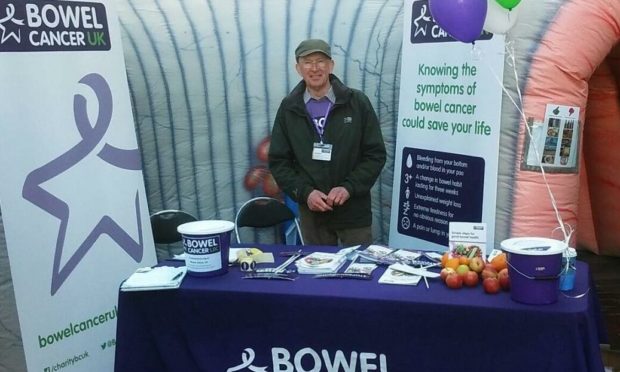Angus bowel cancer survivor Ron Kerr has found the benefits of walking for wellbeing.
World Cancer Research Fund (WCRF) recently announced two new studies which found sitting less and moving more have a positive impact on quality of life after bowel cancer.
That is something which has worked for 81-year-old Ron, who took up walking after his treatment ended.
Ron was diagnosed in 2014 after being referred by his doctor for a colonoscopy saying he feels “lucky because they caught it early.”
After surgery and chemotherapy treatment, he embraced a healthier lifestyle and now walks every day.
He also credits the support of staff at Ninewells Hospital, Maggie’s Centre and sports scientists at Institute of Sport and Exercise (ISE) at Dundee University for supporting him.
He said: “The ISE put me in touch with Paths for All, a walking group which is almost entirely made up of people who have had cancer. I still enjoy these weekly walks.
“I also go out for a walk every day, even if I can do something for half an hour.
“The walking group is a great social thing and quite good too for anyone has a health setback – there’s always people there that you can chat to about it.
“My favourite thing about walking is probably the company, meeting the same people every week and having the peer support.”
As well as being active in the community, Ron also supports Bowel Cancer UK by giving talks to a variety of groups to raise awareness of bowel cancer and its symptoms.
How common is bowel cancer?
Bowel cancer, also known as colorectal cancer, is the fourth most common cancer in the UK.
Cases fell in 2019 in Tayside as the graph below shows.
But in Fife since 2017, the number of cases have risen and the charity Bowel Cancer UK estimates that around 268,000 people in the UK have been diagnosed.
Dr Lisa Wilde, director of research and external affairs at Bowel Cancer UK, says: “These new studies add to growing evidence that physical activity can improve the quality of life for people after they’ve had treatment for bowel cancer.
“While patients may not feel like being active when recovering from treatment, this research shows even engaging in gentle physical activity can have a positive impact.
“You should always check with your healthcare team or physiotherapist before starting any vigorous physical activity after bowel cancer treatment.”
What can I do to reduce the risk?
Dr Wilde added there are ways to help reduce your risk including physical activity and a healthier lifestyle.
Simple changes to your diet can also help for example:
- having plenty of wholegrains and fibre.
- avoiding processed meat.
- limiting red meat.
- being of a healthy body weight.
- stopping smoking.
- cutting down on alcohol.


